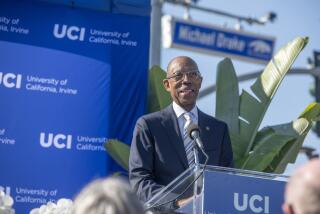UC Academic Senate calls on regents to divest from fossil fuels
The University of California faculty-wide divestment vote drew nearly 77% support.
SAN DIEGO — Faculty at the University of California called on the Board of Regents at a public meeting this week to embrace fossil fuel divestment — submitting a formal recommendation endorsed by a vote of the full Academic Senate.
It’s still unclear whether the university system’s governing body will take up the call to sell off millions of dollars in stocks and bonds in oil and gas companies.
“By acting on this ... the university will be making a strong and clear statement, nationally and internationally, on this most pressing issue of our times,” Academic Senate Chair Robert May told the regents on Wednesday. “This is especially important now, particularly given the appalling vacuum of political leadership at the national level.”
Climate scientists, economists and professors across the 10-campus system voted in July to support divesting the UC system’s roughly $12-billion endowment of all major fossil fuel companies. With about 16% of eligible faculty weighing in, nearly 77% voted in favor of the move.
If the Regents embrace the faculty’s recommendation, it would probably represent the most significant divestment by a public university in the history of the global movement.
Critics of fossil fuel divestment, many deeply concerned about climate change, argue the benefits of such a strategy are negligible, having little effect on stock prices. They have also said that alienating oil, gas and coal companies could be counterproductive to reining in greenhouse gases.
Supporters acknowledge that their campaign is largely symbolic but argue that divestment sends a powerful message.
The campaign to divest from corporations such as ExxonMobil, Gazprom and Shell is one the fastest-growing campaigns in the fight against climate change. To date, it has recorded more than 1,000 pledges on behalf of investment funds worth more than $8 trillion.
The environmental group 350.org spearheaded the divestment movement around 2012, with parallel student campaigns on UC campuses kicking off that year.
In response to the UC faculty’s efforts, 350.org cofounder Bill McKibben released this statement: “This would be one of the biggest moments in the seven-year history of the fossil fuel divestment movement. It would add momentum and weight to the fast-growing global movement to directly confront the forces that are directly responsible for the climate crisis.”
UC professors have organized divestment campaigns in coordination with student groups for several years.
The board has in the past made some concessions in response to such activism, including selling off $200 million in coal and oil sands investments in 2015. The UC system has also committed to going carbon neutral by 2025.
Still, only recently has the full Academic Senate attempted a system-wide vote to put a formal proposal aimed at divestment before the regents.
In large part, that has been thanks to the work of UC San Diego professor Eric Halgren, who spoke at Wednesday’s public hearing.
“We have a lot of moral power and we should be putting that behind divestment, behind dealing with the climate crisis,” Halgren told the regents. “I know you have faced this many times in the past. I think the time to act is now.”
The regents’ office responded to an inquiry by the San Diego Union-Tribune on Wednesday, signaling a willingness to comment on the issue. But the board has yet to issue a formal statement.
Smith writes for the San Diego Union-Tribune.
More to Read
Sign up for Essential California
The most important California stories and recommendations in your inbox every morning.
You may occasionally receive promotional content from the Los Angeles Times.











